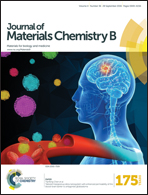Mussel adhesive protein inspired coatings on temperature-responsive hydrogels for cell sheet engineering†
Abstract
Stimuli-responsive materials have been a major subject of investigation for cell sheet technology in regenerative medicine and pharmaceutical research. Most materials and processes, however, have shortcomings, such as a relatively long operation time, varied detachment efficiency, and potential toxicity. In this study, we develop an effective cell sheet translocation protocol using a cell adhesive and temperature-responsive hydrogel. Cell adhesion on the hydrogel was modulated with a bio-inspired coating of polydopamine (PD), the amount of which was tuned to increase as a function of coating time (30–120 min). This PD-coated hydrogel promotes the adhesion of human dermal fibroblasts (HDFBs), mediated by serum protein adsorption, and allows for the formation of a cell sheet (confluent cell monolayer) following culture. Hydrogel cell sheets with 30 min of PD coating (PD30) were readily translocated to a target surface (glass) within 10 min of thermal expansion (induced by changing the temperature from 37 to 4 °C). Under these conditions, the translocation efficiency and cell viability were greater than 90%. However, hydrogel cell sheets with >60 min PD coating remained almost completely attached, while the surfaces exhibited significantly lower cell viability (<50%), suggesting that the regulation of PD coating is a major consideration for translocating cell sheets to their target. Furthermore, the PD30 hydrogel-cultured cell sheet was applied in vivo to the subcutaneous tissue of the mouse model, and thermal expansion was induced by dropping 4 °C saline solution onto the hydrogel, at which point the hydrogel expanded and the cell sheet successfully translocated to the tissue within approximately 20 min. These translocated cell sheets exhibited stable retention over the following 7 days post-transplantation. Together, this shows that the cell adhesive hydrogels developed here could be effectively utilized as a rapid cell delivery tool for use in regenerative medicine.



 Please wait while we load your content...
Please wait while we load your content...